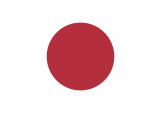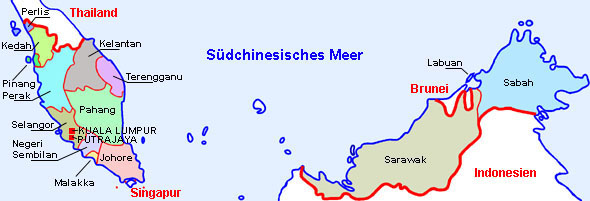Pahang |
|
|
|
| Übersicht – Contents: | |
Diese Seite ist Teil des Projektes
Pahang |
|
|
|
| Übersicht – Contents: | |
Flaggen – Flags: |
|
 |
seit/since 1903 Nationalflagge – national flag, Seitenverhältnis – ratio = 1:2, Quelle/Source, nach/by: Die Welt im bunten Flaggenbild |
 |
seit/since ca. 1948 Standarte des Sultans – standard of the Sultan, Seitenverhältnis – ratio = 1:2, Quelle/Source, nach/by: Die Welt im bunten Flaggenbild |
historische Flaggen – historical Flags: |
|
 |
1853–1887, Nationalflagge – national flag, Quelle/Source, nach/by: Wikipedia (EN) |
 |
1887–1903, Nationalflagge – national flag, Quelle/Source, nach/by: Wikipedia (EN) |
 |
1887–1903, Standarte des Sultans – standard of the Sultan, Quelle/Source, nach/by: Die Welt im bunten Flaggenbild |
 |
1888–1941, Flagge des britischen Residenten – Flag of the British Resident, Quelle/Source, nach/by: Flags of the World |
 |
1903(?)–1948, Gösch der Regierungsschiffe – naval jack of governmental vessels, Quelle/Source, nach/by: Flags of the World, Wikipedia (EN) |
 |
1903–ca.1948, Standarte des Sultans – standard of the Sultan, Quelle/Source, nach/by: Flaggenbuch 1939 |
 |
1941–1945, Pahang ist von Japan besetzt – Pahang is occupied by Japan, Seitenverhältnis – ratio = 7:10, Quelle/Source, nach/by: Wikipedia (EN)  |
Bedeutung/Ursprung der Flagge – Meaning/Origin of the Flag: |
|
| Im 18. und 19. Jahrhundert war Pahang ein vom Sultanat Linnga abhängiger Staat, und verwendete dessen einfarbige schwarze Flagge, jedoch ergänzt um einen weißen Streifen am Liek. Als der Dató Bendahara sich 1887 zum Sultan erklärte, nahm für sich persönlich eine weiße Flagge an. Weiß verkörpert in den meisten Malaienstaaten die Macht und Würde des Sultans. | In the
18th and 19th century Pahang was a from the Sultanate of Linnga dependant
state, and used its single-coloured black flag, but completed by a white
stripe on the leach. As the Dató Bendahara declares itself for a Sultan in 1887, er adoped for his personal use a white flag. White represents in the most Malay states the might and dignity of the Sultan. |
| Am 28.12.1903 nahm Pahang eine neue Flagge an: Sie zeigt bis heute zwei waagerechte Streifen in Weiß und Schwarz. Weiß steht hier folgerichtig für den Sultan, Schwarz für das Volk. | On 28th of December in 1903 Pahang adoped a new flag: It shows until today two horizontal stripes in white and black. White stands for the Sultan as a locical consequence, black for the people. |
| Der Sultan begann seine weiße Flagge um eine goldene Lanzenspitze zu ergänzen. Seit dem Ende des Zweiten Weltkriegs zeigt die Flagge des Sultans von Pahang ihr heutiges Aussehen. | The Sultan began to add his flag by a golden lance head. Since the end of the Second World War the flag of the Sultan of Pahang shows its today's look. |
| Quelle/Source: Die Welt im bunten Flaggenbild, Flaggen Enzyklopädie | |
Wappen – Coat of Arms: |
|
 |
Wappen von Pahang – coat of arms of Pahang, Quelle/Source: By Sultan of Pahang (Reviewed from muziumpahang.com.my) [Public domain], via Wikimedia Commons |
Bedeutung/Ursprung des Wappens – Meaning/Origin of the Coat of Arms: |
|
| Das zentrale Element des Wappens ist eine Pfeilspitze, kombiniert mit zwei Stoßzähnen. Ganz unten ein Spruchband mit dem Namen des Staates, unter anderem auch in lateinischen Buchstaben. | The central element of the coat of Arms is an arrowhead, combined with two tusks. At the bottom there is a banner with the name of the state, including in Latin letters. |
| Quelle/Source: Die Welt im bunten Flaggenbild, Volker Preuß | |
Landkarte – Map: |
|
|
| Die Bundesstaaten Malaysias – the Federal States of Malaysia: |
| interaktive Landkarte – interactive Map |
 nach/to Malaysia? => hier klicken – click here |
| Zahlen und Fakten – Numbers and Facts: | |
|
|
|
|
|
|
|
|
|
|
|
|
|
|
|
|
|
|
|
|
|
|
|
|
7.–12.Jhd. · zum Reich Shrividjaja 15. Jhd. · Staat Pahang 17. Jhd. · Pahang kommt unter Kontrolle des Sultanats Aceh 18. Jhd. · Pahang kommt unter Kontrolle des Sultanats Lingga 1887 · beginnender britischer Einfluss in Pahang, der Dató Bendahara (niederer Statthalter) von Lingga, der Pahang regiert, erklärt sich zum Sultan → Trennung von Lingga 1888 · die Briten erklären Pahang zum Protektorat 1895 · Perak, Pahang, Selangor, Negeri Sembilan werden zu den "Föderierten Malaienstaaten" zusammengefasst (Malaiischer Bund, bis 1941) 1941 · japanische Eroberung 1945 · Abzug der Japaner 01.04.1946 · Bildung der Malaiischen Union durch Zusammenschluss der Malaiischen Sultanate (Britische Protektorate) und der Straits Settlements (Britische Kronkolonien), jedoch ohne Singapur. 01.02.1948· Reorganisation der Malaiischen Union, Bildung der Malaiischen Föderation unter einem britischen Hochkommissar 31.08.1957 · Unabhängigkeit und Proklamation des Königreiches Malaiische Föderation 16.09.1963 · Proklamation des Königreiches Malaysia durch Zusammenschluss der Malaiischen Föderation (Malaya) mit den ehemaligen britischen Kolonien Sarawak, Sabah (Nordborneo) und Singapur. Brunei lehnte den Beitritt ab und verblieb bei Großbritannien 09.08.1965 · Singapur verlässt die Föderation von Malaysia |
| 7th–12th
cent. · to the Shrividjaja Empire 15th cent. · State of Pahang 17th cent. · Pahang comes under control of the Sultanate of Aceh 18th cent. · Pahang comes under control of the Sultanate of Lingga 1887 · beginning British influence in Pahang, the Dató Bendahara (lower proconsul) of Lingga – he governs Pahang – declares itself to a Sultan → separation from Lingga 1888 · the British declare Pahang to an protectorate 1895 · Perak, Pahang, Selangor, Negeri Sembilan become summarized to the "Federated Malay States" (until 1941) 1941 · Japanese conquest 1945 · withdrawal of the Japanese 1st of April 1946 · formation of the Malay Union by confederation of the Malaysian Sultanates (British protectorates) and the Straits Settlements (British crown colonies), but without Singapore. 1st of February in 1948· re-organization of the Malaysian Union, creation of the Malaysian Federation under a British High Commissioner 31st of August 1957 · independence and proclamation of the Kingdom of Malaysian Federation 16th of September 1963 · proclamation of the Kingdom of Malaysia by confederation of the Malaysian Federation (Malaya) with the former British colonies Sarawak, Sabah (North Borneo) and Singapore. Brunei rejects the joining and remains at Great Britain 9th of August 1965 · Singapore leaves the Federation of Malaysia |
| Quelle/Source: Atlas zur Geschichte, Wikipedia (EN), Die Welt im bunten Flaggenbild |
Ursprung des Landesnamens – Origin of the Country's Name: |
|
| Der Name des Landes geht auf den Fluss Pahang zurück, an dessen Mündung Pekan liegt, die Residenz des Sultans. | The country takes its name from the Pahang River, at the mouth of which lies Pekan, the Sultan's residence. |
| Quelle/Source: Wikipedia (EN) | |